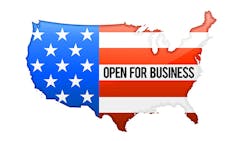As Walmart has set trends in a variety of areas, such as adoption of RFID tags, could they also be considered trendsetters for the reshoring movement?
While that might be too strong of a statement, their upcoming “Made in the USA” Open Call, taking place July 7-8, which offers appointments for suppliers to present products is completely filled and there is a waiting list for companies who are producing products in the U.S. and want to become Walmart suppliers. ( To present to Walmart outside of this event register here.) While some of these companies are newly formed, others are companies who have brought production back to the U.S.
While there are many reasons for companies to bring production back to the U.S., the top two reasons being more expensive labor costs in other locations (mostly China), and the low price of energy in the U.S., it might also be that as Walmart goes, so too does the rest of the retail world.
Harry Moser, the founder of the Reshoring Initiative, who will be participating in the summit, says that currently there is a project in every U.S. state, that resulted from last year's Summit. There are actually 150 projects underway, says Moser. He knows this since many of them have called him asking for advice on his Total Cost of Ownership Estimator (TCO) estimator which takes into account a variety of factors when determining if a product should be reshored.
Another tool that companies are using to determine the costs associated with choosing locations is the Cost Differential Frontier which was developed by Professors Suzanne de Treville and Norman Schürhoff of the University of Lausanne, Switzerland. ( For more information on this method see this blog. )
“Companies are asking themselves if they risk losing their position with Walmart if they don’t move back or at least produce some products in the U.S.” says Moser. “Walmart has made it clear that they risk losing their shelf space to U.S.-produced products. “
Moser’s organization, which champions reshoring, reports that 38 companies have reshored to supply Walmart.
Projecting forward, if Walmart reaches its goal of purchasing an addition $250 billion worth of products made in the U.S. by its targeted date of 2023, this could add as much as $300K jobs, Moser says.
But even before it reaches that goal, the economy will see a large reduction in imports over the next few years as products consumers want will be produced right here says Moser.
The prospect of more manufacturing plants in the U.S.employing more people is attracting the attention of economic developers who will attend the Summit to meet with potential suppliers in hope that their state will be chosen for these new factories. This aspect of the match-making is new to the Summit’s agenda this year. Also new is the fact that AME and MEPs across the country will attend.
Returning back to the original question however, it remains to be seen if Walmart can push the needle of reshoring in a major way, and in fact become a trendsetter. They need to be joined by other big box retailers.
About the Author
Adrienne Selko Blog
Senior Editor
Focus: Expansion Management & the Biotech & Life Sciences Industries
Email: [email protected]
Follow Adrienne on Twitter: @ASelkoIW
Call: 216-931-9235
Senior Editor Adrienne Selko manages IndustryWeek’s Expansion Management, delivering ideas and information about how successful manufacturers leverage location to gain competitive advantage. She explores the strategies behind why companies located their headquarters, research institutes, factories, warehouse and distribution centers and other facilities where they did, and how they benefit from the decision.
Adrienne is also the editorial coordinator of the IndustryWeek Expansion Management Roundtable events, which unites economic development professionals to network and discuss the latest trends in site location.
As well, Adrienne tells the stories of successful companies in the biotechnology and life sciences industries.
In the past, Adrienne has managed IndustryWeek’s award-winning website, overseeing eNewletters, webinars, and contributed content. Before joining the staff, Adrienne was managing editor of corporate publications at a large regional financial institution. She also ran a public relations and marketing company that published a best-selling healthcare book.
Adrienne received a bachelor’s of business administration from the University of Michigan and is especially interested in wellness and natural health.
